Attacks on Russia seen as prelude to Ukraine counteroffensive
Strikes on Russian infrastructure including drone attacks on refineries and train sabotage have multiplied in recent weeks, with experts suggesting they are part of Ukraine’s preparations for an expected spring offensive.
Agence France-Presse reports that Kyiv has not claimed any of the acts denounced by Moscow as Ukrainian “sabotage” of “unprecedented momentum”, but the majority appear to target Russian army supply chains in border regions and in annexed Crimea, a base for Russian troops.
Mykhailo Samus, deputy director of the Centre for Army, Conversion and Disarmament Studies in Kyiv, said:
All of this was done to prepare for an offensive. I am sure that the intensity [of the attacks] will increase.
A senior Ukrainian official, speaking anonymously, said that “these are standard measures for limiting the capabilities of the Russian armed forces”.
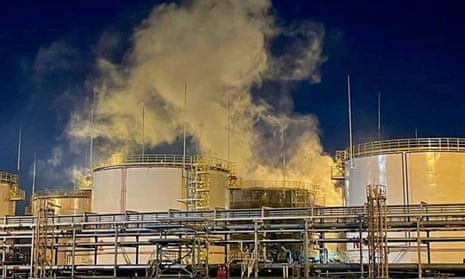
Oil facilities – essential for supplying the troops – appear to be the priority targets of the attacks, which have been generally carried out with drones.
The list of incidents has expanded on a near daily basis. On Thursday, a drone was shot down near an airbase in Sevastopol in the Crimea peninsula annexed by Russia in 2014. That same day, Russia’s southern Krasnodar and Rostov regions, both near Ukraine, reported drone strikes that caused fires. On Friday, another fire broke out at the same oil refinery in Krasnodar.
Over the past week, two fuel depots also caught fire, in and around Crimea, while last weekend an overnight Ukrainian strike on the Russian border village of Suzemka left four dead.
Also in Russia’s Bryansk region bordering Ukraine, two freight trains derailed earlier this week after explosive devices went off on the tracks.
Key events Show key events only Please turn on JavaScript to use this feature
Concerns in the Russian leadership about its vulnerability to attacks and the potential for public protests over the Ukraine war have contributed to the decision to cancel many Victory Day parades, citing security concerns, the UK’s Ministry of Defence has said.
In its latest intelligence briefing, the ministry said six Russian regions, occupied Crimea and 21 cities had cancelled their parades on Tuesday marking the Soviet Union’s victory over Nazi Germany.
The ministry said:
The timing of the UAV strike on the Kremlin a few days before Victory Day shows Russia’s increasing vulnerability to such attacks and has almost certainly raised the threat perception of the Russian leadership over the Victory Day events.
The potential for protests and discontent over the Ukraine war are also likely to have influenced the calculus of the Russian leadership.
Moscow’s Victory Day celebration was likely to go ahead but on a smaller scale, said the briefing, posted on Twitter, but the reception for President Vladimir Putin after the parade – last held in 2019 – would not go ahead.
Kherson’s weekend curfew is the latest inconvenience for residents who, after enduring months of Russian occupation last year, have been subjected to daily bombardments by Russian troops encamped nearby on the other side of the River Dnipro.
Despite their retreat from Kherson city last November, Russian forces still hold large swathes of territory in the wider Kherson region that Ukraine wants to recapture, Reuters reports.
Russian shelling on Wednesday killed 23 people in Kherson city, and attacks on Ukrainian-controlled parts of the Kherson region continued on Friday, regional authorities said.
Some residents left Kherson in cars and buses on Friday while others stocked up on groceries before a 56-hour curfew began on Friday evening in the southern Ukrainian city.
Reuters reports that the announcement of the curfew, lasting until Monday morning, prompted speculation in Kherson that the city was about to be used as a launch point for Ukraine much-anticipated counterattack.
Iryna Chupryna, a former real estate manager, said:
Everybody understands it [the curfew]. It means it is necessary for our military.
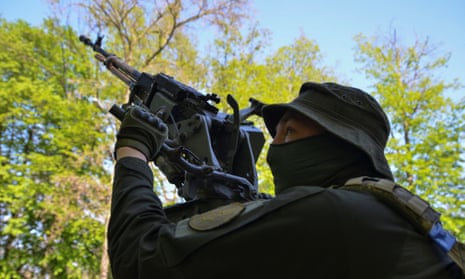
Some residents said they left because they were scared, others because they did not want to spend most of the weekend indoors.
Local authorities gave little away about the reason for the curfew, beyond saying it was intended to enable law enforcement agencies to “conduct their activities in Kherson”.
No one will be allowed to enter or exit the city during the curfew, and residents must limit their movements to short walks outside their homes.
Attacks on Russia seen as prelude to Ukraine counteroffensive
Strikes on Russian infrastructure including drone attacks on refineries and train sabotage have multiplied in recent weeks, with experts suggesting they are part of Ukraine’s preparations for an expected spring offensive.
Agence France-Presse reports that Kyiv has not claimed any of the acts denounced by Moscow as Ukrainian “sabotage” of “unprecedented momentum”, but the majority appear to target Russian army supply chains in border regions and in annexed Crimea, a base for Russian troops.
Mykhailo Samus, deputy director of the Centre for Army, Conversion and Disarmament Studies in Kyiv, said:
All of this was done to prepare for an offensive. I am sure that the intensity [of the attacks] will increase.
A senior Ukrainian official, speaking anonymously, said that “these are standard measures for limiting the capabilities of the Russian armed forces”.

Oil facilities – essential for supplying the troops – appear to be the priority targets of the attacks, which have been generally carried out with drones.
The list of incidents has expanded on a near daily basis. On Thursday, a drone was shot down near an airbase in Sevastopol in the Crimea peninsula annexed by Russia in 2014. That same day, Russia’s southern Krasnodar and Rostov regions, both near Ukraine, reported drone strikes that caused fires. On Friday, another fire broke out at the same oil refinery in Krasnodar.
Over the past week, two fuel depots also caught fire, in and around Crimea, while last weekend an overnight Ukrainian strike on the Russian border village of Suzemka left four dead.
Also in Russia’s Bryansk region bordering Ukraine, two freight trains derailed earlier this week after explosive devices went off on the tracks.
Opening summary
Hello and welcome back to our coverage of the Russia-Ukraine war, now in its 437th day. I’m Adam Fulton and let’s begin with a rundown on the latest events.
Increasing attacks on Russian infrastructure in recent weeks are part of Ukraine’s preparations for its long-anticipated spring offensive, experts suggest.
The majority of the strikes appear to be targeting Russian army supply chains in border regions and in annexed Crimea, a base for Russian forces.
In the southern city of Kherson, meanwhile, a 56-hour curfew began on Friday evening and some residents left the city after the curfew announcement prompted speculation that it was about to be used as a launching point for Ukraine’s counterattack.
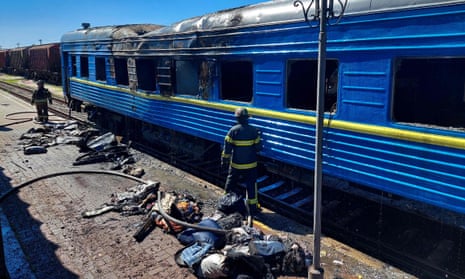
More on those stories shortly. In other news as it turns 9am in the Ukrainian capital, Kyiv:
The leader of Russia’s Wagner mercenary force has said that his forces will leave Bakhmut, which they have been trying to capture since last summer. Yevgeny Prigozhin said they would pull back on Wednesday 10 May – ending their involvement in the war’s longest battle – because of heavy losses and inadequate ammunition supplies and asked defence chiefs to put regular army troops in their place. But Ukraine said Wagner fighters were reinforcing positions to try to seize the eastern city before that date.
Prigozhin earlier released a video showing him standing in a field of Russian corpses and blaming defence chiefs for the losses suffered by his fighters in Ukraine, appearing to reignite his simmering feud with Russian top brass.
Russia’s defence minister, Sergei Shoigu, has carried out an inspection of troop readiness for forces engaged in the war, in an apparent coded response to Prigozhin’s criticism.
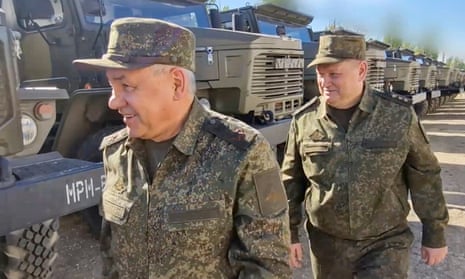
Ukraine said two people have been killed and nine wounded in the eastern Donetsk region and electricity distribution networks have been damaged by shelling in the Donetsk and Kherson regions.
Authorities in the Russian-occupied areas of Zaporizhzhia have begun evacuating villages near the frontline. The Russian-installed governor, Yevgeny Balitsky, announced the move in anticipation of a Ukrainian offensive aimed at retaking the area, claiming Kyiv’s forces had “stepped up shelling of settlements close to the frontline” in the past few days.
Engineers have reduced the risk of a dam bursting and damaging the Russian-held Zaporizhzhia nuclear power plant in Ukraine, a senior Russian official was quoted by state news agency Tass as saying on Friday. Renat Karchaa, an adviser to the general director of energy engineering firm Rosenergoatom, said specialists had begun discharging water from the Kakhovka hydroelectric dam on the Dnieper River in southern Ukraine.
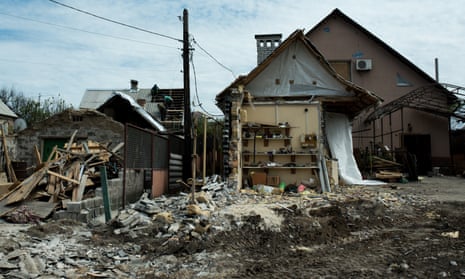
A Moscow court has ordered the arrest of a theatre director and a playwright on charges of “justifying terrorism” over an award-winning play about Russian women recruited online to marry radical Islamists in Syria. Director Yevgeniya Berkovich and author Svetlana Petriychuk were placed in custody until 4 July, Russian news agencies reported.
Bill Clinton has said he knew in 2011 it was just “a matter of time” before the Russian president attacked Ukraine. “Vladimir Putin told me in 2011 – three years before he took Crimea – that he did not agree with the agreement I made with Boris Yeltsin,” the former US president recalled. “He said … ‘I don’t agree with it. And I do not support it. And I am not bound by it.’ And I knew from that day forward it was just a matter of time.”

 1 year ago
173
1 year ago
173










 English (US)
English (US)